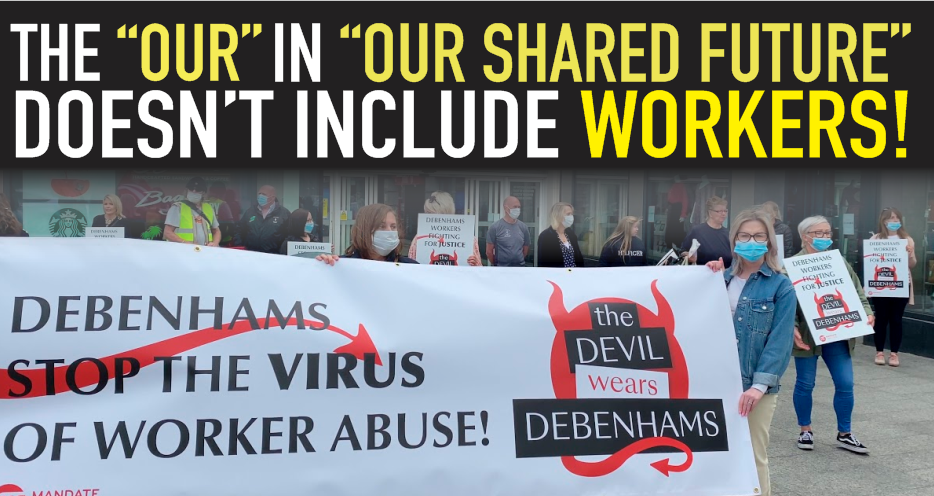By Michael O’Brien
The programme for government now approved by the Fianna Fáil, Fine Gael and Green parliamentary parties, and set to be voted upon by their respective memberships, is entitled “Our Shared Future” and runs to 126 pages.
However, the “Our” in the document title does not include workers and those who believe in the need for a strong and fighting trade union movement, free of legal impediments to organising.
Conspicuous by its absence
The criticisms from others in terms of what is in the document regarding housing, environment, direct provision and other policies are all well founded. However, what isn’t in the document deserves comment as well, and in the case of workers’ rights, they don’t even merit the lip service given to other issues!
In an overall sense, where there is state aid being promised in response to the economic collapse, it is geared towards employers and not workers. Public ownership in, for example, the aviation sector, state investment in jobs and state enterprises to replace the thousands of jobs being shed in the private sector is, unsurprisingly, off their agenda.
There is a promise to examine liquidation laws from the point of view of the rights of workers. That this was inserted into the document is entirely down the Debenhams workers. Their campaign has exposed that there has been no improvement since the Clerys closure four years ago in companies being allowed to creatively arrange their finances to avoid real scrutiny by workers. This would allow workers to build a case for saving jobs or, at least, obtaining enhanced redundancies.
The emphasis on public transport is not matched by a promise to ditch the neo-liberal approach of the outgoing government, in terms of handing lucrative routes to private operators who typically have worse terms and conditions.
Workers’ pay and rights
The Defence Forces, their representative organisation PDFORRA and support groups like Wives and Partners of the Defence Forces, like so many others, have been promised a commission when the issues of rampant low pay and appalling conditions are patent.
An Employment Regulation Order for childcare workers is promised, but only after a process of engagement with employers in the sector. This could take years and is designed to forestall the workers themselves, thousands of whom have signed up to SIPTU, forcing the pace of decent pay and conditions through action.
There is only one specific mention of the trade unions in the whole 126 pages. Under the heading of Public Service Pay Deal, in a typically woolly paragraph, it says:
“We will seek to negotiate a new public pay deal with the public service unions. Our approach to those negotiations will be guided by the State’s financial position and outlook, challenges in relation to recruitment and retention, and conditions within the broader labour market. We will be anchored in the respect for the important role played by public servants. As part of any pay deal, we will ensure that there is an emphasis on embedding positive work practice changes that have emerged from the COVID-19 Emergency, as well as general productivity gains and effectiveness, based on measurable outcomes. We will introduce a bargaining clause in the new agreement to make progress on sectoral issues.”
The wording is designed, on one level, to encourage the likes of nurses and teachers to believe that there will be special settlements for them that would encourage recruitment and retention, even though Fine Gael and the Public Service Pay Commission incredibly denied that there were problems on this front during the previous government. However, overall there is nothing there to indicate real cost-of-living pay rises for workers, and silence on the lingering injustice of two-tier pay.
They are not specific about what they term as “positive work practice changes” emerging from the Covid emergency. However, privatisation by outsourcing of work in, for example, the Department of Social Protection is something that they are keen to retain post-Covid in the face of opposition from the local branch of Fórsa.
The trade union movement we need
The Irish Congress of Trade Unions (ICTU) recently published a document entitled “No Going Back”, setting out their policy platform for the post-lockdown phase. In general, it sets the bar low, with mild redistributionist policies to improve public services and welfare.
However, it does catalogue some of the key workers’ rights issues where change is needed, none of which are addressed in the draft programme for government. They include
· An end to bogus self-employment, including on state funded projects
· State aid and contracts given to companies to be linked to their recognition of trade unions and state industrial relations mechanisms
· A statutory occupational sick pay scheme – all the more urgent for public health reasons
· Collective bargaining rights and the right of unions to access workplaces to organise – that some workers who have worked through the lockdown – such as retail workers in Dunnes, Lidl, Aldi – do not enjoy the right of having their union recognised by the employers is intolerable
Most of the trade union officialdom have relied on a strategy of political lobbying and the reinstatement of some form of social partnership under a different name as means of improving the pay and conditions of workers. This is not adequate. The message from the programme for government is clear – workers will have to fight for jobs, pay, conditions and their rights if this government forms in the coming weeks. The power of workers’ industrial action is key to winning our rights.












